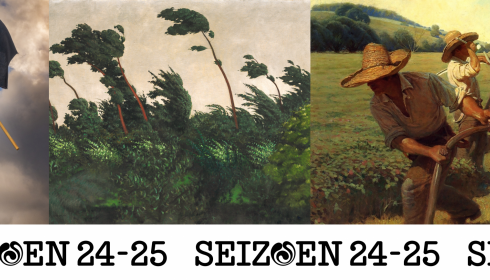
The starting point is De Meeuw (The Seagull) by Anton Chekhov, one of the greatest and tenderest plays in the world repertoire: a classic from 1896 about young people wanting to explore new ideas and an older generation that feels threatened by this. A narrative about the longing for the past and the longing for a free life, told from the perspective of three different generations. Love and desire as the devastating driving force during a family reunion. A comedy in four acts, as the Russian playwright himself called it.
[meeuw] is an encounter with performers from the Flemish deaf community, with Flemish Sign Language as mother tongue. The mixed cast comprises three deaf and five hearing performers: Yousra Boukantar, Sofie Decleir,
Tom Dewispelaere, Lobke Leirens, Lut Reysen, Willy Thomas, Serge Vlerick and Yana Wuytjens. Together, they search for a common language: the gesture.
“I’ve gone past your house so many times, but I couldn’t bring myself to come in. Come, let’s sit down.” – Nina Mikhailovna Zarechnaya
____
Selected for The Theatre Festival (Flanders) 2025
Selected for the Dutch Theatre Festival 2025
Nominated for the Theo d'Or 2025 in the category most groundbreaking stage performance
Winner of The Hand of Flanders 2025
The Dutch jury wrote:
"[meeuw] is an entirely new translation into Flemish Sign Language of Chekhov’s The Seagull, performed by a mixed cast of hearing and deaf actors. Seldom has a Chekhov had such an invigorating and multifaceted reinterpretation. Instead of performing with a sign language interpreter on stage, the hearing members of the cast spent two years intensively studying Flemish Sign Language in order to master it themselves.”
"Traditionally, forms of perception designed for people with a disability are ‘added’ to existing forms, as if accessibility were an extra on top of the standard. This show cancels that paradigm and makes inclusion (for deaf people) a fundamental principle. Language barriers disappear, while at the same time a mirror is held up to the audience: disabilities are not inherent to the individual, but are the effect of dominant norms that are constantly repeated on and off stage. As such, [meeuw] is suffused down to the smallest detail with a total vision of what theatre could be: radically accessible (in this case, for deaf people) and boundlessly connective."
"If you want to see the most extraordinary performance of the year, be sure and make time for this seagull."
"In [meeuw] you are looking not so much at a story but at people with longings and shortcomings. This, of course, is thanks to Chekhov, who created great characters, but certainly also to the eight actors, who throw themselves into it completely."
"Yana Wuytjens, the star of the evening as 'Konstantin', emphasizes the 'tragic' in this tragicomedy"
"This production was anything but easy to make because of all the barriers, yet on top that the makers still found room to break away from patriarchal norms, and also to show how difficult it is to crawl out of our bubble in this polarized world – but not impossible, which [meeuw] shows too."
"This ‘[Seagull]’ does justice to Chekhov in an original way, by deploying sign language as a rich expressive tool that erases the distinction between people with impaired hearing and those who can hear normally. All of the actors have equal footing on stage. When Stijn Van Opstal thought of doing a play in sign language, it seemed like a real gamble. Thanks to the efforts of the actors, coaches and interpreters, however, it turned out to be a total triumph. This is simply a very good staging of one of the most moving plays in dramatic history. Stijn Van Opstal gambled and won."
"In [meeuw], Olympique Dramatique rewrites Chekhov's The Seagull with Flemish Sign Language (VGT) as the main language. This forces upon you as a spectator a different economy of the senses, different decisions about where to place your focus, actually a very different sensibility. As a result, the subtle class struggle that Chekhov always conducts goes a step further: here, communication is questioned, and even language itself.... Sign language becomes the norm, logocentrism assumes a different form; what dominates is gesture, not spoken language."
"Chekhov's wonderful classic only gains strength in sign language.... This performance and certainly the surprising ending make for the most moving production of The Seagull that I have ever seen. Chekhov, in a new form."
"The best way of learning a language is encountering. And seeing as my language is theatre, I looked for people in order to make a show with them. My curiosity became an ambition, and in mid-November The Seagull will be the first repertory play to be performed in Flemish Sign Language at the Bourla."
"I really hadn't thought that the hearing actors would be able to gesticulate so fluently. And offstage we can already communicate fairly well, too. I always found that to be very important: for us to make a production that is of completely equal standing."
"‘Finally, deaf actors are no longer outsiders’: Olympique Dramatique presents Chekhov in sign language"
"When the sound cuts out, you are forced to look at the other person differently. There is immense beauty in observing people trying to understand each other."
"I loved being able to look purely at the actors for once - when I normally go to the theatre, I can only do that with surtitles or an interpreter, and I have to constantly divide my attention between the translation and what is happening on stage."
"Antwerp's Toneelhuis plays ‘Seagull’ in sign language with deaf and hearing actors."
"Chekhov creates comedies with immense humour and compassion about the stumbling man we have apparently been for centuries. ‘The Seagull’ in particular is, as far as I am concerned, one of the most beautiful and tender plays in theatre history."
"Olympique Dramatique performing Chekhov's ‘Seagull’ in sign language is a first. Listen to the radio report (in Dutch)"
"No one can more tenderly analyse the fumbling man than Chekhov"
"Premiere of *Seagull* in Flemish Sign Language."
"The often-cited truth that Chekhov's characters cannot hear each other is brought out in a theatrically clear manner through the use of sign language. The emotional nuances are not lost in the process – rather, they become stronger, sometimes almost grotesque, but always dramatically perceptible."
after
- De Meeuw van Tsjechov
director
- Stijn Van Opstal
adaptation
- Stijn Van Opstal
- Scarlet Tummers
- Tom Dewispelaere
- Francis Geeraert
- (met dank aan Ilja Leonard Pfeijffer)
translation into Flemish Sign Language
- Diane Boonen
- Sam Verstraete
- Hilde Verhelst
- e.a.
performance
- Yousra Boukantar
- Sofie Decleir
- Tom Dewispelaere
- Lobke Leirens
- Lut Reysen
- Willy Thomas
- Serge Vlerick
- Yana Wuytjens
dramaturgy
- Scarlet Tummers
set
- Damiaan De Schrijver
- Stijn Van Opstal
light design
- Frank Hardy
costume design
- Monique Van Hassel
production
- Toneelhuis
- Olympique Dramatique
coproduction
- theater arsenaal
with the support of
- Silence Radio
- Doof Vlaanderen
- doof&events
- Vlaams GebarentaalCentrum (VGTC)
- KU Leuven Campus Antwerpen (Toegepaste Taalkunde)
- de spelers van de Nationale Loterij
- Literatuur Vlaanderen
- Koning Boudewijnstichting
- Tax Shelter maatregel v/d Belgische federale overheid via LOOK@LEO


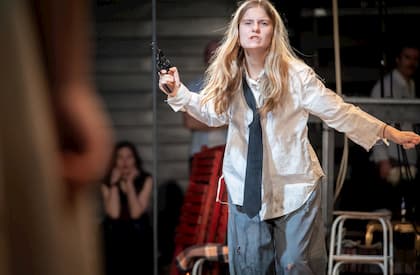

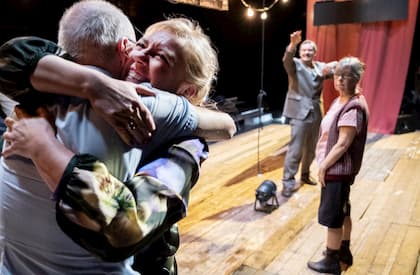
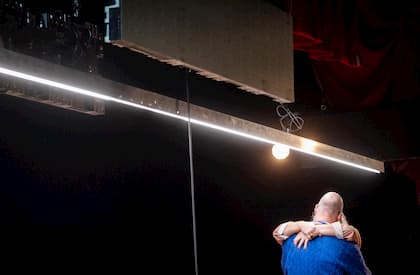
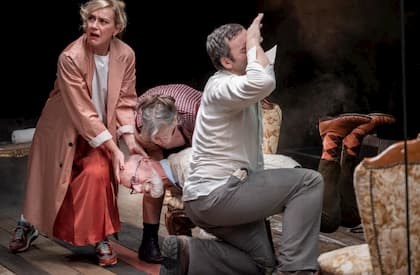
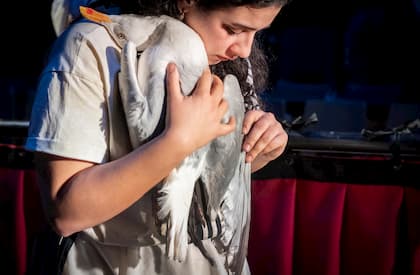
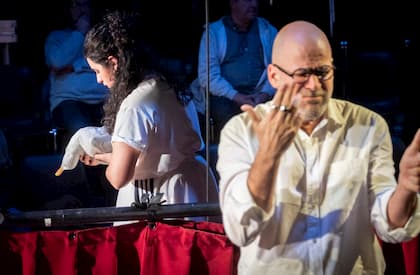
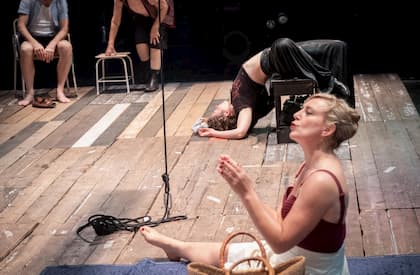
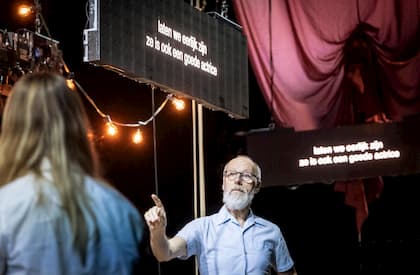
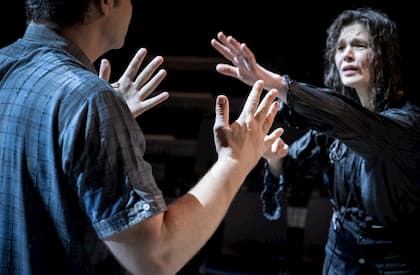



![[meeuw] wins “Hand of Flanders” in the Professional of the Year category](https://toneelhuis.be/images/news/overview-block/a13tl00000qohbliaw1660x720-8.jpg)
![[meeuw] wins Theo d’Or 2025!](https://toneelhuis.be/images/news/overview-block/a13tl00000oxiq4iai1660x720.jpg)
![[meeuw] and Werken en dagen selected for Theatre Festivals](https://toneelhuis.be/images/news/overview-block/a13tl00000oishgiah1660x720-1.jpg)
![[meeuw]: learning to look and listen in a different way](https://toneelhuis.be/images/news/overview-block/meeuworiginal-3.png)
